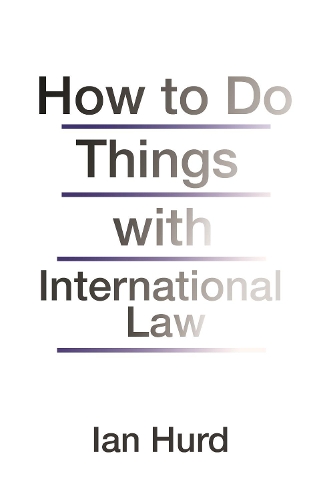
How to Do Things with International Law
(Paperback)
Available Formats
Publishing Details
How to Do Things with International Law
By (Author) Ian Hurd
Princeton University Press
Princeton University Press
4th November 2019
United States
Classifications
Tertiary Education
Non Fiction
International law
Politics and government
Geopolitics
341
Physical Properties
Paperback
200
Width 140mm, Height 216mm
Description
A provocative reassessment of the rule of law in world politics Conventionally understood as a set of limits on state behavior, the "rule of law" in world politics is widely assumed to serve as a progressive contribution to a just, stable, and predictable world. In How to Do Things with International Law, Ian Hurd challenges this received wisdom. Bringing the study of law and legality together with power, politics, and legitimation, he illustrates the complex politics of the international rule of law. Hurd draws on a series of timely case studies involving recent legal arguments over war, torture, and drones to demonstrate that international law not only domesticates state power but also serves as a permissive and even empowering source of legitimation for state action-including violence and torture. Rather than a civilizing force that holds the promise of universal peace, international law is a deeply politicized set of practices driven by the pursuit of particular interests and desires. The disputes so common in world politics over what law permits and what it forbids are, therefore, fights over the legitimating effect of legality. A reconsideration of the rule of law in world politics and its relationship to state power, How to Do Things with International Law examines how and why governments use and manipulate international law in foreign policy.
Reviews
"Runner-Up for the 2018 Chadwick Alger Prize, International Studies Associations International Organization Section"
"In this insightful book, Hurd argues that international law is actually best understood as a tool of state power--less an externally imposed constraint than a resource that governments employ to authorize and legitimize what they want to do."---G. John Ikenberry, Foreign Affairs
"Hurd proposes the compelling argument that law does not just prohibit conduct, but it implicitly permits other conduct, so states will push law to permit the conduct they wish to engage in. . . . A refreshing dose of pragmatism."---Eleanor Healy-Birt, interLib
"Essential reading for everyone who engages with international law and international politics."---Rajeesh Kumar, Rest Journal
Author Bio
Ian Hurd is associate professor of political science at Northwestern University. He is the author of After Anarchy (Princeton) and International Organizations.
